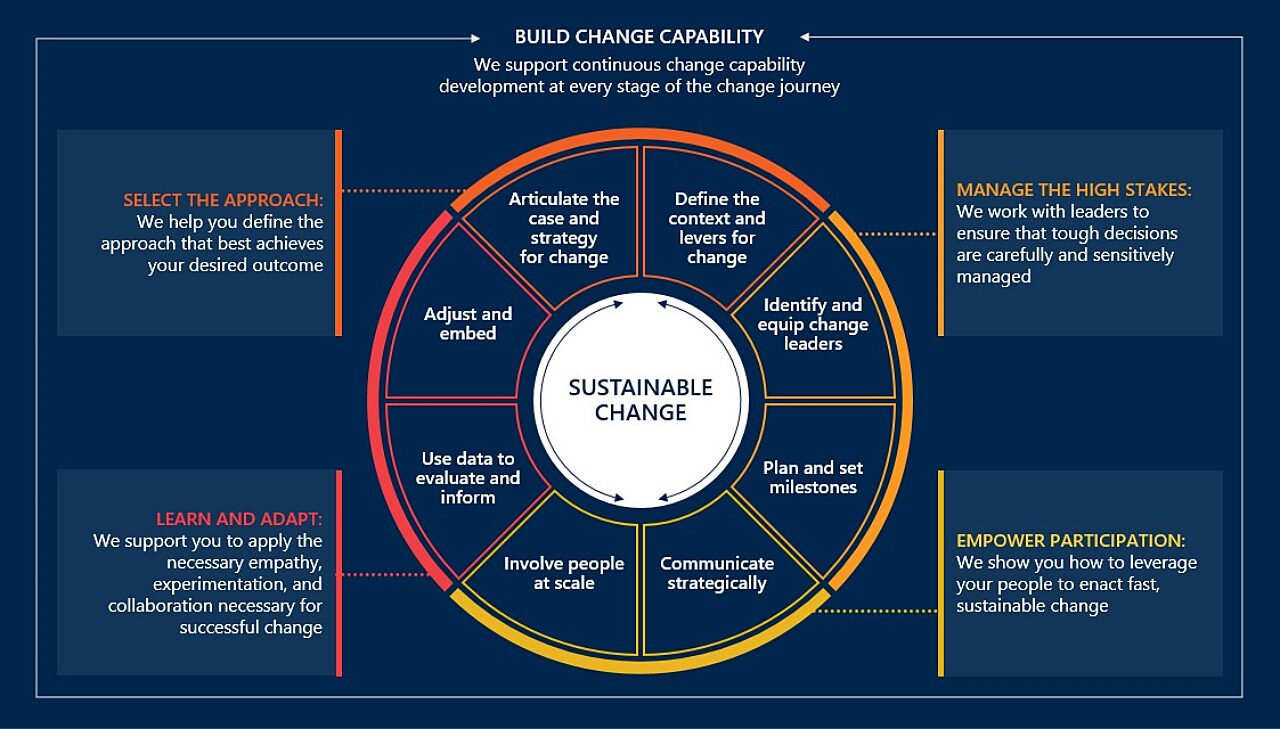Idea In Brief
Change fatigue is widespread
After two decades of disruption, many organisations are finding that it is difficult to get their people on board with their change agendas.
Lasting change requires strong leadership
If leaders are not unified on the change agenda and its priorities, it can create confusion and disrupt delivery efforts.
Asking the right questions is crucial
At each stage of our approach, we ask our clients targeted questions that further enable them to achieve their objectives.
Your inbox is overflowing, your budget is tight, your team has staffing gaps, your organisation has officially become ‘Agile’, is moving to a new organisational structure and you’re sick of it. Why won’t they just let you get on with your job? Then some bright spark says: “How about we all get behind this shiny new change agenda?” No wonder people are jaded and frustrated.
The volume of change that organisations are expected to manage has increased substantially. Our clients’ operating contexts are changing rapidly, so they need to more frequently redesign their operating models. The organisation and the people within it are expected to respond and adapt to change more quickly than ever, often accompanied by competing change agendas across the organisation.
We have seen the impact of these circumstances on our clients. Change fatigue is widespread across both public and private sector workforces, in people’s personal as well as professional lives. Over the past two decades, we’ve been through two global recessions; a digital revolution in the way we communicate and plan our lives; and a pandemic that forced organisations to undertake rapid, transformational changes in order to continue operating.
This has changed the workplace as we know it, forcing us to embrace hybrid working, significantly increase our use of technology, and reimagine physical spaces. Add to that an extended period of global unrest and escalating climate concerns and it’s no wonder that individuals are tired of change.
In this article, we consider the difficulty organisations face managing change in a continually overwhelming climate and pinpoint how you can overcome challenges in your organisation to achieve lasting change. We explore three factors that have enabled our clients to successfully change: leadership, governance, and accountability.
Most organisations still struggle to make change happen
In 2015, McKinsey claimed that 70 per cent of change and transformation projects fail. While there has been academic debate about the validity and empirical evidence supporting this number, we often meet with organisations that have underinvested in change management and need support to get back on track or to decipher how to do better next time.
Our work with these organisations has surfaced three factors that greatly contribute to change initiatives failing—or succeeding!
- Leadership | Successful and lasting change cascades through organisations from the top down. If leaders are not unified on the change agenda and its priorities, it can create confusion and disrupt delivery efforts. If change efforts aren’t initially driven by senior leaders, it can suggest a lack of legitimacy. Visible leaders who share clear and united messaging on the change agenda drive momentum and signal to staff, who may be change fatigued, which priorities staff need to engage with. While it sounds obvious, hands-on leaders who lead by example often get the biggest buy-in to change from their staff.
- Governance | Change initiatives that lack discipline and structure can lead to disorganisation and conflicting prioritisation of change activities. Systematised use of governance techniques such as scheduling, resource, risk, issue and scope management work to facilitate better-informed decision-making, ensure that fewer things go wrong, and ensure that, when things do go wrong, they are readily identified and effectively resolved. These techniques are not difficult to execute, but when change programs and projects are fully or partly resourced with staff who are supporting the work alongside their day job, the consistent application of governance tends to fall away, and programs and projects start to lose shape.
- Accountability | Change programmes that lack clear accountabilities are seldom successful. Accountability is a cornerstone of successful implementation. By establishing clear accountabilities and expectations across every level of an organisation, and holding individuals to account, organisations can drive greater levels of trust and contribute to the development of a high-performing culture.
You can see these three factors in action
You can see these three factors in action in some recent work where we partnered with a UK public sector organisation to deliver a whole-of-organisation digital transformation. Our client had a history of inconsistent decision making and adherence to process. As a result, this large and ambitious change agenda needed to be underpinned by an early introduction of strong governance and accountability mechanisms.
After developing the digital transformation strategy, we worked with leaders across their different functions to develop key messaging that would support communication of the strategy and highlighted the benefits their different stakeholders would value.
We then designed new governance arrangements that identified the accountabilities and responsibilities needed to facilitate the transformation, and ways of working that would help to identify when people stepped outside of the agreed governance.
Our early work to get leaders on the same page, employees excited about what the change would mean for them, and governance arrangements in place to support the transition, meant that when the transformation agenda moved into the implementation stage, staff engaged with process more positively.
Asking the right questions can position a change journey for success
Long-term change requires a sustainable approach that builds buy-in and change capability throughout the change journey and various levels of the organisation.
Our approach to change (below) is informed by research on leading practices, and our insights from partnering with public and private sector organisations around the world.


At each stage of our approach, we factor in thinking on leadership, governance and accountability, and ask our clients targeted questions that further enable them to achieve their objectives:
- Select the approach | What’s driving your need for change? What benefits will the change enable for your organisation, your people and your partners? What existing strengths can you build on and leverage to deliver the change? Where will change be most difficult? How will you pace your change agenda?
- Manage the high stakes | How can you facilitate coherence among your leaders? What do they need to successfully drive change in their respective areas and when? How will you measure progress and hold them accountable?
- Empower participation | What motivates your people? What messages will resonate with their needs? Who can you engage across your organisation whose influence or capabilities can be used to drive sustainable change?
- Learn and adapt | How often will you review progress? How does your organisation approach continuous improvement? How will you communicate about what you learn?
Asking these questions throughout your change journey helps to ensure your journey has well-paced activities that build momentum and excitement while responding to an evolving context.
People are at the heart of each step of change management
We know that people make the biggest difference, so change programmes need to be underpinned by clear accountabilities and controls.
Leaders and other people throughout the organisation must be enabled to deliver the change smoothly. Building in evaluation points along the change journey allow people to give and receive feedback, understand where change has landed well, or where it has hit hard, and iteratively improve.
Creating space for and acknowledging feedback, then communicating what improvements have been made in response, can go a long way towards helping an organisation reset after a tough and tiring period of change.
For example, Nous has previously provided implementation support to drive whole-of-sector reform for an Australian Government agency. After previously attempting and failing to achieve lasting reform, the agency’s staff and stakeholders were frustrated and exhausted by change, and such reform seemed impossible.
We worked in partnership with leaders across the agency to develop an updated change management and implementation strategy and roadmap that articulated a fit-for-purpose delivery approach, a supporting program management toolkit, and practical and intuitive insights tool that would aid effective decision making and action.
A people-centred approach enabled by effective leadership, governance and accountability is key to success
Change journeys can be daunting. But using an overarching approach that enables continuous improvement, along with clear leadership, governance and accountabilities, means lasting change is possible.
Even when change has gone wrong and everyone is exhausted, there are many ways to get a change journey back on track. Our experience shows us that when organisations take a thoughtful, well-planned, people-centred approach to change, it works well.
The first step is a compelling case for change that explains to your people why they should get on board, and now.
Get in touch to discuss your how-to plan or optimise the change journey to meet the specific needs of your organisation.
Connect with Abby Nduva or Ellen Falconer on LinkedIn.
Prepared with support from Matthew Clayfield, Ari Sharp, Julie Mercer and Darren Leafe.


